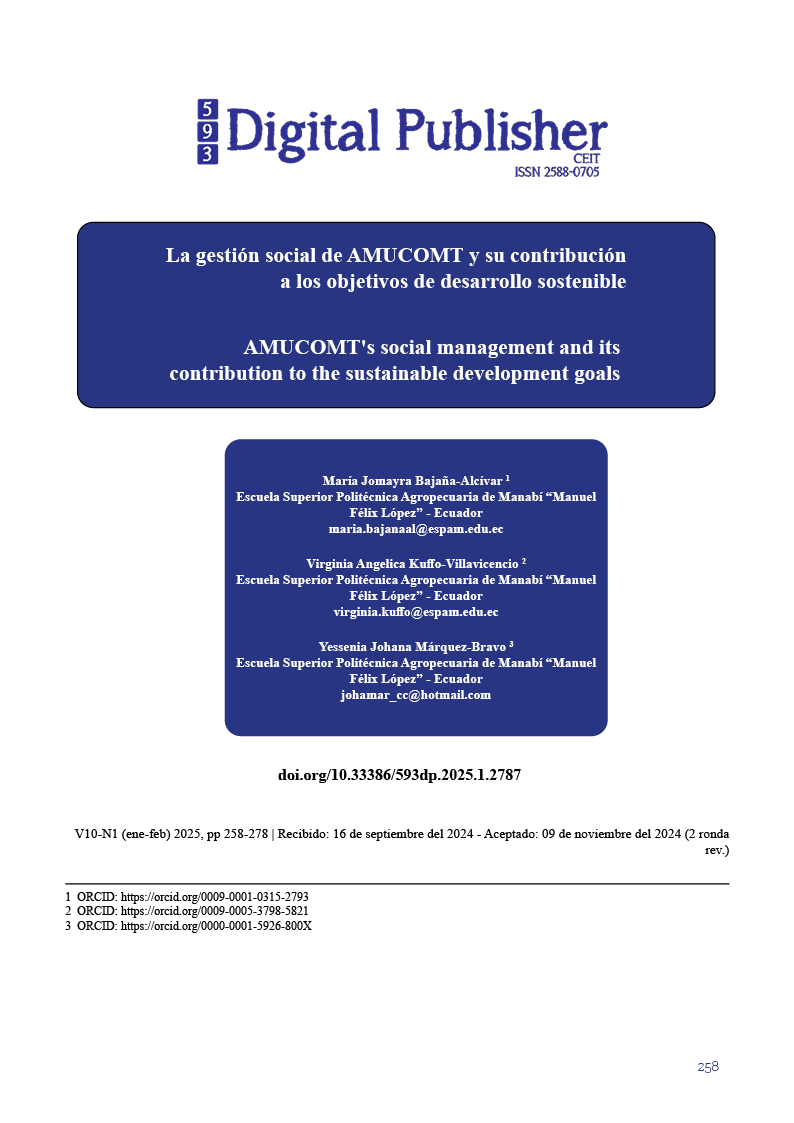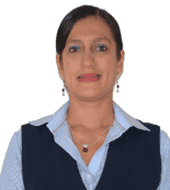AMUCOMT's social management and its contribution to the sustainable development goals
Main Article Content
Abstract
The 2030 Agenda has positioned itself as one of the goals to be achieved in the global landscape; in this sense, the contribution of organizations through social management becomes a critical catalyst for the achievement of these goals. The purpose of this study focused on analyzing the social management of the Association of Community Women of the Tosagua Canton (AMUCOMT) to determine its contribution to the Sustainable Development Goals. The methodology focused on a mixed approach, using bibliographic and field modalities; based on analytical, descriptive, deductive and inductive methods. In addition, an interview was conducted with the person responsible for administrative management in order to identify the activities that contribute to sustainable development, and an observation form was used to complement the information. The results determined that most of the objectives present a moderate state of progress, highlighting SDG 16 as the most developed (100%), while the objective of implementing sustainable energy was positioned as the most decreasing with 16.67%. It is concluded that the actions carried out by AMUCOMT have a notable impact in contributing to the SDGs, however, it is important to give continuity to projects and intensify efforts especially for goals 3, 6, 7, 8, and 14, since they show a level of stagnation in their development.
Downloads
Article Details

This work is licensed under a Creative Commons Attribution-NonCommercial-ShareAlike 4.0 International License.
1. Derechos de autor
Las obras que se publican en 593 Digital Publisher CEIT están sujetas a los siguientes términos:
1.1. 593 Digital Publisher CEIT, conserva los derechos patrimoniales (copyright) de las obras publicadas, favorece y permite la reutilización de las mismas bajo la licencia Licencia Creative Commons 4.0 de Reconocimiento-NoComercial-CompartirIgual 4.0, por lo cual se pueden copiar, usar, difundir, transmitir y exponer públicamente, siempre que:
1.1.a. Se cite la autoría y fuente original de su publicación (revista, editorial, URL).
1.1.b. No se usen para fines comerciales u onerosos.
1.1.c. Se mencione la existencia y especificaciones de esta licencia de uso.
References
Alcívar Martínez, B., Ordoñez Gilces, Y. V., Quito Zambrano, M. Y., y Álvarez Vidal, M. E. (2024). Cuadro de mando integral como herramienta de gestión para la Asociación de Mujeres Comunitarias AMUCOMT. Revista Multidisciplinaria Voces de América y el Caribe, 1(1), 262-285. https://doi.org/10.5281/zenodo.11254419
Costa, M. P., Armijos, V. A., Martínez, V. A., Loaiz, F. S., y Aguirre, G. I. (2017). Claves determinantes en la formalización de un modelo de gestión de impulso del desarrollo sostenible de empresas asociativas rurales: Estudio de las sociedades agro-productivas en el Ecuador. Revista ESPACIOS, 38(08). https://www.revistaespacios.com/a17v38n08/17380817.html
Esteban Romaní, L., y Vázquez Gómez, L. (2023). Objetivos de Desarrollo Sostenible y Acción Social. Una experiencia de incorporación de ODS en la planificación estratégica de una entidad sin ánimo de lucro. Itinerarios de Trabajo Social, 3, 7-13. https://doi.org/10.1344/its.i3.40282
Gómez Torrealba, X. A., y Chávez, M. (2024). Generalidades sobre el Mapeo de Alcance como herramienta para las Organizaciones No Gubernamentales en proyectos de desarrollo sostenible. Sapientia Technological, 5(1), 48-55. https://doi.org/10.58515/020RSPT
Global Reporting Initiative [GRI], United Nations Global Compact, & World Business Council for Sustainable Development [WBCSD]. (2024). SDG Compass – A Guide for Business Action to Advance the Sustainable Development Goals. Recuperado el 11 de julio de 2024 de https://sdgcompass.org/
Instituto Nacional de Estadística. (2021). Indicadores de la Agenda 2030 para el Desarrollo Sostenible. https://www.ine.es/prensa/ods_2021.pdf
Instituto Nacional de Estadística y Censos. (2024). Boletín Técnico N° 12-2024-ENEMDU (Pobreza y desigualdad.). https://www.ecuadorencifras.gob.ec/documentos/web-inec/POBREZA/2024/Junio/202406_Boletin_pobreza_ENEMDU.pdf
León Serrano, L. A., Bustos Carpio, G. E., y Pardo Asanza, F. A. (2022). Evolución de la Economía Popular y Solidaria y su impacto en el desarrollo social-productivo del Ecuador, 2008-2021. Revista Ciencias Pedagógicas e Innovación, 10(2), 119-126. https://doi.org/10.26423/rcpi.v10i2.625
Márquez Bravo, Y. J. (2024). Gestión social y calidad de vida: Revisión de corrientes teóricas. Revista San Gregorio, 1(1),120-132. https://doi.org/10.36097/rsan.v1iEspecial_1.2901
Matteo, C., y Graterol, E. (2017). Proyectos sociales: Metodología e implicaciones para la gerencia social. Revista Venezolana de Análisis de Coyuntura, 23(2), 161-185. http://saber.ucv.ve/ojs/index.php/rev_ac/article/view/14718
Organización de las Naciones Unidas. (2015). Proyecto de documento final de la cumbre de las Naciones Unidas para la aprobación de la agenda para el desarrollo después de 2015. Recuperado el 28 de mayo de 2024 de https://digitallibrary.un.org/record/803344/files/A_RES_69_315-ES.pdf
Peñarrieta Párraga, B. A., Álava Párraga, J. I., y Toala Mendoza, S. T. (2024). EVALUACIÓN DE COMPORTAMIENTO ORGANIZACIONAL Y HABILIDADES COMPETITIVAS EN LA ASOCIACIÓN AMUCOMT. Revista Científica Arbitrada Multidisciplinaria de Ciencias Contables, Auditoría y Tributación: CORPORATUM 360, 7(13), 127-144. https://doi.org/10.56124/corporatum-360.v7i13.007
Prefectura de Manabí. (2023). Metodología de cálculo de la contribución de la prefectura de Manabí a la agenda 2030 de los ODS. https://www.manabi.gob.ec/wp-content/uploads/2023/04/METODOLOGIA-CONTRIBUCION-.pdf
Proaño Ponce, W. P., y Alay Barcia, T. V. (2020). Gestión del conocimiento para el análisis de obligaciones fiscales establecidas en las asociaciones del ámbito socio-económico en Jipijapa. Ecuadorian Science Journal, 4(2), 56–62. https://doi.org/10.46480/esj.4.2.81
Ricaurte Pinto, B. N., y Afanador Quintero, E. A. (2023). Evolución del cumplimiento de los Objetivos de Desarrollo Sostenible en Santander entre los años 2019 y 2020 [Tesis de Grado, Universidad Autónoma de Bucaramanga]. https://repository.unab.edu.co/handle/20.500.12749/20531
Sachs, J. D., Lafortune, G., & Fuller, G. (2024). The SDGs and the UN Summit of the Future (Sustainable Development Report 2024). Dublin: Dublin University Press. https://doi.org/10.25546/108572
Salas Vizcarra, D. H. (2022). Gestión social y desarrollo sostenible en América Latina y el Caribe (2011-2021). Ciencia Latina, 6(1), 2506-2519. https://doi.org/10.37811/cl_rcm.v6i1.1663
Salvatierra Zambrano, M. B., Rosado Alcívar, M. B., Márquez Bravo, Y. J., y Montesdeoca Arteaga, D. V. (2024). GESTIÓN SOCIAL Y CALIDAD DE VIDA EN LAS ASOCIACIONES AGROPRODUCTIVAS. REVISTA CIENTÍFICA MULTIDISCIPLINARIA ARBITRADA YACHASUN, 8(15), 2-19. https://www.editorialibkn.com/index.php/Yachasun/article/view/467
Sánchez, M., Fernández, M., y Díaz, J. (2021). Técnicas e instrumentos de recolección de información: Análisis y procesamiento realizado por el investigador cualitativo. Revista Científica UISRAEL, 8(1), 107-121. https://doi.org/10.35290/rcui.v8n1.2021.400
Toledo, L., Changoluisa Chiguano, R. L., y Viteri Salazar, O. (2023). INFLUENCIA DE LA AGRICULTURA EN LA ECONOMÍA Y SU CONTRASTE FRENTE A LOS OBJETIVOS DE DESARROLLO SOSTENIBLE: CASO ECUADOR. Universidad-Verdad, 83, 28-49. https://doi.org/10.33324/uv.v2i83.697
Anexo A. Ficha de Observación




